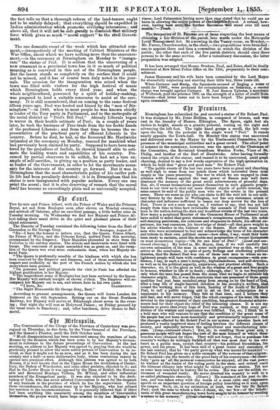The one domestic event of the week which has attracted
com- ment, —irrespectively of the meeting of Cabinet Ministers at the War Office, about which we have nothing more than the announce- ment,—is the ceremony at Birmingham on Monday to "inaugu- rate" the statue of Peel. It is seldom that the uncovering of a new ornament in a provincial town has in it so much of political meaning as is conveyed in this act of the Birmingham people. But the lesson stands so completely on the surface that it could not be missed, and it has of course been duly noted in the jour- nals. The occasion for the inauguration was seized when the town was filled with visitors for the high festival of music which Birmingham holds every third year, and when the whole neighbourhood, possessed by a spirit of holiday-making, was prepared to lend a suitable concourse to assist at the cere- mony. It is still remembered, that on coming to the same festival fifteen years ago, Peel was hooted and hissed by the "men of Bir- mingham "—in 1840, when to most people he was known chiefly as leader of the Tory party in Parliament, and to the metropolis of the metal district as "Peel's Bill Peel." kiready Liberals began to waver in their hostile estimate of Peel; in a couple of years later, he took the business of Free-trade from the too feeble hands of the professed Liberals ; and from that time he became the re- presentative of the practical party of efficient Liberals in the country. Before he died, he had, as the Reverend Mr. Fardwicke intimated at the ceremony on Monday, rescued for mankind what had previously been claimed by party. Supposed to have been mas- tered by the prejudices of faction, he showed himself able to esti- mate the leading wants and capabilities of his country. Pre- sumed by partial observers to be selfish, he had set a rare ex- ample of self-sacrifice, in giving up a position as party leader, and as leader of the Government, in order to let the movements neces- sary for the interests of the country go forward. But it was in Birmingham that the most characteristic policy of his earlier pub- lic life had been peculiarly detested; it is in Birmingham that his statue is now inaugurated with popular acclaim. Every one can point the moral ; but it is also deserving of remark that the moral itself has become so exceedingly plain and so universally accepted.


























 Previous page
Previous page